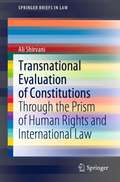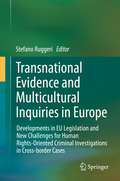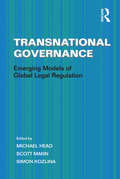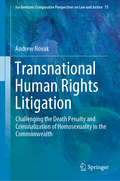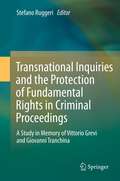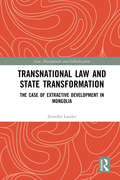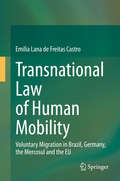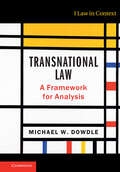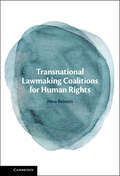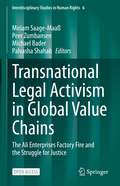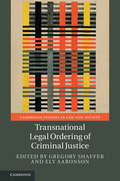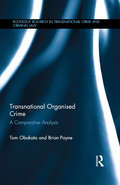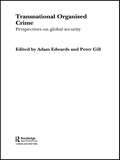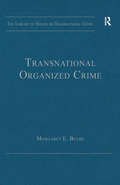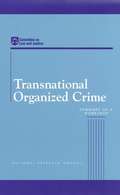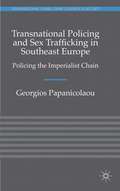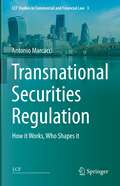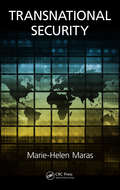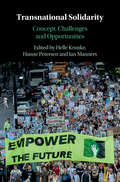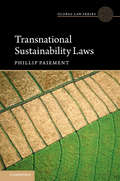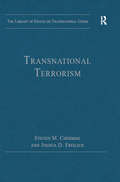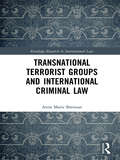- Table View
- List View
Transnational Evaluation of Constitutions: Through the Prism of Human Rights and International Law (SpringerBriefs in Law)
by Ali ShirvaniThis book provides a hypothetical classification of constitutions through international law and human rights values used in any constitution, which draws connections between the inclusive standards of international law and human rights contained in the constitutions. Consequently, an evaluation method will be available for users to rank any constitution potentiality of analysis for grounds of any commitment and responsibility of the states concerning international law and human rights."This important study uses novel quantitative and qualitative methods to explore the relationship between constitutional and international law. It is a significant contribution to the literature, and pushes us further toward rigorous analysis of transnational legal regimes."Tom Ginsburg Professor of Political Science, Chicago Law School.
Transnational Evidence and Multicultural Inquiries in Europe
by Stefano RuggeriThis book deals with the gathering of evidence in cross-border investigations in Europe. The issue of obtaining evidence in and from European countries has been among the most debated issues of EU cross-border cooperation in criminal matters over the last two decades, going through periods of intensive discussions and showing an extraordinary adaptability to the evolution of EU legislation for criminal matters. On the other hand, the prosecution and investigations of cross-border cases pose unprecedented challenges in the European scenario, characterized by the increasing flow and activity of citizens over the territory of more than one country and therefore by the need to lay the foundations of a transcultural criminal justice system. The book analyses this complex topic starting with the current perspectives of EU legislation, thus providing a critical analysis of the legislative initiative aimed at introducing a new tool for gathering almost any type of evidence in other Member States, i. e. , the European Investigation Order. On a second level, this study deals with the solution models and human rights challenges posed by the increasingly intensive dialogues between domestic and supranational case laws, and formulates essential guidelines for setting up a fair transnational enquiry system in Europe.
Transnational Governance: Emerging Models of Global Legal Regulation
by Scott MannAs globalization continues to spread and evolve, so nation-states attempt to govern financialization, tax evasion, corruption, terrorism, civil and military conflicts and environmental dangers, social polarization and the complexities in human rights implementation, by institutional and transnational means. This volume discusses these issues from different legal perspectives and highlights the challenges of governing human activity in an age of remarkable interconnectedness. Covering a broad range of policy areas and analysis of emerging forms of governance from liberal to critical and Marxist, the chapters are legal in their approach and form an important contribution to the growing study of emergent forms of authority, coordination and power developing in response to the challenges presented by some of the key contemporary governance issues in the first half of the twenty-first century.
Transnational Human Rights Litigation: Challenging the Death Penalty and Criminalization of Homosexuality in the Commonwealth (Ius Gentium: Comparative Perspectives on Law and Justice #75)
by Andrew NovakThis book analyzes the role of strategic human rights litigation in the dissemination and migration of transnational constitutional norms and provides a detailed analysis of how transnational human rights advocates and their local partners have used international and foreign law to promote abolition of the death penalty and decriminalization of homosexuality. The “sharing” of human rights jurisprudence among judges across legal systems is currently spreading emerging norms among domestic courts and contributing to the evolution of international law. While prior studies have focused on international and foreign citations in judicial decisions, this global migration of constitutional norms is driven not by judges but by legal advocates themselves, who cite and apply international and foreign law in their pleadings in pursuit of a specific human rights agenda. Local and transnational legal advocates form partnerships and networks that transmit legal strategy and comparative doctrine, taking advantage of similarities in postcolonial legal and constitutional frameworks. Using examples such as the abolition of the death penalty and decriminalization of same-sex relations, this book traces the transnational networks of human rights lawyers and advocacy groups who engage in constitutional litigation before domestic and supranational tribunals in order to embed international human rights norms in local contexts. In turn, domestic human rights litigation influences the evolution of international law to reflect state practice in a mutually reinforcing process. Accordingly, international and foreign legal citations offer transnational human rights advocates powerful tools for legal reform.
Transnational Inquiries and the Protection of Fundamental Rights in Criminal Proceedings
by Stefano RuggeriThe protection of fundamental rights in the field of transnational criminal inquiries is of great delicateness in the current tangled web of domestic and international legal sources. Due to this complex scenario, this research has been carried out from a four-level perspective. The first part provides a critical analysis of the multilevel systems of protecting fundamental rights from the perspective of supranational and constitutional case law, and in the field of international and organized crime. The second part focuses on EU judicial cooperation in three main fields: financial and serious organized crime, mutual recognition tools, and individual rights protection. The third part provides the perspectives of ten domestic legal systems in two fields, i.e., obtaining evidence abroad and cooperation with international criminal tribunals. The fourth part analyses cross-border inquiries in comparative law, providing a reconstruction of different models of obtaining evidence overseas.
Transnational Law
by Kaarlo Tuori Miguel Maduro Kaarlo Tuori Suvi Sankari Miguel MaduroIn this era of globalisation, different legal systems and structures no longer operate within their own jurisdictions. The effects of decisions, policies and political developments are having an increasingly wide-reaching impact. Nowhere is this more keenly felt than in the sphere of European Union law. This collection of essays contributes to the co-operative search for interpretative and normative grids needed in charting the contemporary legal landscape. Written by leading lawyers and legal philosophers, they examine the effects of law's de-nationalisation by placing European law in the context of transnational law and demonstrate how it forces us to rethink our basic legal concepts and propose an approach to transnational law beyond the dichotomy of national and international law.
Transnational Law and State Transformation: The Case of Extractive Development in Mongolia (Law, Development and Globalization)
by Jennifer LanderThis book contributes new theoretical insight and in-depth empirical analysis about the relationship between transnational legality, state change and the globalisation of markets. The role of transnational economic law in influencing and reorganising national systems of governance evidences the constitutional dimensions of global capitalism: the power to institute new rules and limits for national states. This form of new constitutionalism does not undermine the state but transforms it by eroding national capacities and implanting global alternatives. While leading scholars in the field have emphasised the much-needed value of case studies, there are no studies available which consider the cumulative impact of multiple axes of transnational legal ordering on the national state or its constitution. This monograph addresses this empirical gap, whilst expanding the theoretical scope of the field. Mongolia’s recent transformation as a mineral-exporting country provides a rare opportunity to witness economic and legal globalisation in process. Based on careful empirical analysis of national law and policy-making, the book traces the way distinctive processes of transnational legal ordering have reorganised and reframed the governance of Mongolia’s mining sector, specifically by redistributing state power in relation to the market, sub-national administrations and civil society. The book investigates the role of international financial institutions, multinational corporations and non-governmental organisations in normative transmission, as well as the critical role of national actors in embedding transnational investment norms within the domestic legal and policy environment. As the book demonstrates, however, the constitutional ramifications of transnational legal ordering extend beyond the mining regime itself into more fundamental questions of the trajectory of state transformation, institutionally and ideologically. The book will be of interest to scholars of international law, global governance and the political economy of development.
Transnational Law of Human Mobility: Voluntary Migration in Brazil, Germany, the Mercosul and the EU
by Emília Lana de Freitas CastroThis book employs methods from comparative law to analyze voluntary migration, exploring the free movement of immigrants and their freedom of settlement under Brazilian and Mercosul law, as well as under German law and the European Union’s legal framework on migration. It discusses the level of protection granted to immigrants in terms of their right to enter and stay in Brazil and Mercosul, using German legislation and the EU’s legal framework on migration for comparison. Accordingly, the book will help migration researchers to understand not only the structure and rationale of migration law in Brazil, especially after the entry into force of its recent Migration Law in 2017, but also its relation to EU and German provisions on voluntary migration. It demonstrates how the differing natures of the migration law adopted by Brazil and Germany have led to different approaches and, consequently, different levels of protection for immigrants.
Transnational Law: A Framework for Analysis (Law in Context)
by Michael W. DowdleGlobalisation impacts every aspect of modern society and today's law graduates are expected to deal with complex legal problems that require knowledge and training that goes beyond domestic law. This textbook provides an overview of how law is becoming increasingly transnational, facilitating theoretical and practical engagement with transnational legal institutions and phenomena. It advances an analytic framework that will help students to understand what to look for when they encounter transnational legal institutions and practices, and what are the practical and normative implications of their findings. By considering both the theory and practice of transnational law and taking a discursive approach to the material, students are encouraged to arrive at their own conclusions. Adopting interdisciplinary techniques and using case studies from around the world, this book offers a holistic, balanced exploration of a new and emerging discipline.
Transnational Lawmaking Coalitions for Human Rights
by Nina ReinersTransnational Lawmaking Coalitions is the first comprehensive analysis of the role and impact of informal collaborations in the UN human rights treaty bodies. Issues as central to international human rights as the right to water, abortion, torture, and hate speech are often only clarified through the instrument of treaty interpretations. This book dives beneath the surface of the formal access, procedures, and actors of the UN treaty body system to reveal how the experts and external collaborators play a key role in the development of human rights. Nina Reiners introduces the concept of 'Transnational Lawmaking Coalitions' within a novel theoretical framework and draws on a number of detailed case studies and original data. This study makes a significant contribution to the scholarship on human rights, transnational actors, and international organizations, and contributes to broader debates in international relations and international law.
Transnational Legal Activism in Global Value Chains: The Ali Enterprises Factory Fire and the Struggle for Justice (Interdisciplinary Studies in Human Rights #6)
by Peer Zumbansen Michael Bader Miriam Saage-Maaß Palvasha ShahabThis open access book documents and analyses the various interventions – legal, political, and even artistic – that followed the Ali Enterprises factory fire in Karachi, Pakistan, in 2012. It illuminates the different substantive and procedural aspects of the legal proceedings and negotiations between the various local and transnational actors implicated in the Ali Enterprises fire, as well as the legal and policy reforms sparked by the incident. This endeavour serves to embed these legal cases and reform efforts in the larger context of human and labour rights protection and global value chain governance. It also offers a concrete case study relevant for ongoing debates around the role of transnational approaches in making human rights litigation, advocacy, and law reform more effective. In this regard, the book interrogates and critically reflects on such legal campaigns and local and transnational reform work with a view to future transformative legal and social activism.
Transnational Legal Ordering and State Change
by Gregory ShafferLaw can no longer be viewed through a purely national lens. Transnational legal ordering affects the boundary of the state and the market, the allocation of power among national institutions, the role of professions and their expertise, and associational patterns that provide new normative frames. This book breaks new ground for understanding the impacts of transnational legal ordering within nation-states in today's globalized world. The book addresses the different dimensions of state change at stake and the factors that determine these impacts. It brings together leading scholars from sociology and law who study the effects of transnational legal ordering within different countries. Their case studies illustrate how transnational legal ordering interacts with national law and institutions in different regulatory areas, and cover anti-money laundering, bankruptcy, competition, education, intellectual property, health, and municipal water law and policy in different countries. The book explains the extent and limits of transnational legal ordering in today's world.
Transnational Legal Ordering of Criminal Justice (Cambridge Studies in Law and Society)
by Gregory Shaffer Ely AaronsonHard and soft law developed by international and regional organizations, transgovernmental networks, and international courts increasingly shape rules, procedures, and practices governing criminalization, policing, prosecution, and punishment. This dynamic calls into question traditional approaches that study criminal justice from a predominantly national perspective, or that dichotomize the study of international from national criminal law. Building on socio-legal theories of transnational legal ordering, this book develops a new approach for studying the interaction between international and domestic criminal law and practice. Distinguished scholars from different disciplines apply this approach in ten case studies of transnational legal ordering that address transnational crimes such as money laundering, corruption, and human trafficking, international crimes such as mass atrocities, and human rights abuses in law enforcement. The book provides a comprehensive treatment of the changing transnational nature of criminal justice policymaking and practice in today's globalized world.
Transnational Legal Orders
by Terence C. Halliday Gregory ShafferThis book offers a pathbreaking, empirically grounded theory that reframes the study of law and society from a predominantly national context, which dichotomizes the study of international law and national compliance into a dynamic perspective that places national, international, and transnational lawmaking and practice within a coherent single frame. By presenting and elaborating on a new concept, transnational legal orders, this book offers an original approach to the emergence of legal orders beyond nation-states. It shows how they originate, where they compete and cooperate, and how they settle on institutions that legally order fundamental economic and social behaviors that transcend national borders. This original theory is applied and developed by distinguished scholars from North America and Europe in business law (corporate bankruptcy, transport of goods by sea, secured transactions law, and international taxation), regulatory law (monetary and trade, finance, food safety, and climate change), and human rights (rule of law, use of indicators regarding human rights treaties, trials of political leaders, right to health and access to medicines, and human trafficking).
Transnational Organised Crime: A Comparative Analysis (Routledge Research in Transnational Crime and Criminal Law)
by Tom Obokata Brian PayneOrganised crime covers a wide range of activities, including drug trafficking, illegal trafficking of people, and fraud. The existence of a land border does not impede these operations; instead in many cases it is used to their advantage. In response, law enforcement strategies must include a transnational, multi-agency approach. This book critically analyses the extent to which Northern Ireland and the Republic of Ireland have been successful in implementing effective action against transnational organised crime. It explores the adoption of key law enforcement strategies and measures in these jurisdictions, and evaluates how regional (EU law) and international (UN Convention) standards have been implemented at the national level. Drawing on interviews with over 90 stakeholders including the Department of Justice Northern Ireland, the Department of Justice and Equality in Ireland, the Police Service of Northern Ireland and An Garda Síochána, Tom Obokata and Brian Payne discuss the factors affecting the effective prevention and suppression of organised crime, particularly in relation to cross-border cooperation. In exploring challenges of transnational crime and cooperation, this book will be of great use to students and researchers in international and transnational criminal law, criminology, and crime prevention.
Transnational Organised Crime: Perspectives on Global Security (Organizational Crime)
by Peter Gill Adam EdwardsThe perceived threat of 'transnational organized crime' to Western societies has been of huge interest to politicians, policy makers and social scientists over the last decade. This book considers the origins of this crime, how it has been defined and measured and the appropriateness of governments' policy responses. The contributors argue that while serious harm is often caused by transnational criminal activity - for example, the trafficking in human beings - the construction of that criminal activity as an external threat obscures the origins of these crimes in the markets for illicit goods and services within the 'threatened' societies. As such, the authors question the extent to which global crime can be controlled through law enforcement initiatives, and alternative policy initiatives are considered. The authors also question whether transnational organised crime will retain its place on the policy agendas of the United Nations and European Union in the wake of the 'War on Terror'.
Transnational Organized Crime (The\library Of Essays On Transnational Crime Ser.)
by Margaret E. BeareThis selection of influential articles traces our evolving understanding of transnational organized crime - paradigm shifts - from the 'alien conspiracy' focused research to the more nuanced focused scholarship on 'markets' and 'networks', culminating in a focus on 'enablers' of transnational crimes and evaluations of 'harm' from transnational crimes. The selected essays and articles reflect the way in which politics, economics and social factors have impacted on scholarly thinking and the introduction also highlights the many authors and professionals who have been influential in this field. This volume is an essentialone-stop resource for lecturers and students interested in all aspects of transnational organized crime.
Transnational Organized Crime: Summary of a Workshop
by Committee on Law JusticeCrime statistics assail us from the front pages of newspapers around the country--and around the globe. As the world's economic systems become integrated, as barriers to trade, travel, and migration come down, criminal opportunities have rapidly expanded across national borders. Transnational crime has become a problem of considerable political urgency that requires long-term attention. The United States and other countries are devoting significant resources to its investigation and control. The National Academies Committee on Law and Justice convened a workshop to elicit ideas about this phenomenon and to discuss the research and information needs of policy officials. This report lays out the full range of research issues and makes useful suggestions for learning more about transnational crime.
Transnational Policing and Sex Trafficking in Southeast Europe
by Georgios PapanicolaouMounting a vigorous critique on existing approaches to transnational policing, thisbook lays out an argument situating transnational policing within contemporary transformations of the capitalist state and imperialism. Focusing on aparticular case of regional police cooperation against sex trafficking in Southeast Europe, the study shows how contemporary dominant discourses on sex trafficking ultimately facilitate the implementation of new aggressive state strategies against migration and migrant workers and legitimise new police powers and operational capabilities at an international scale. "
Transnational Securities Regulation: How it Works, Who Shapes it (LCF Studies in Commercial and Financial Law #3)
by Antonio MarcacciThe book provides an analysis of the emergence, evolution, and transformation of transnational securities regulation and of the influences from and the interactions between global regulatory powers in the field. Combining insights from law and political science, the work employs a two-tier complementary "on-the-books" and "in-action” approach. The more classical "on-the-books" approach draws on scholarship in United States and European Union securities regulation; transnational regulation and global administrative law; regime complexity; global governance studies; and the regulatory production of the International Organisation of Securities Commissions (IOSCO). The law in-action approach leverages the author’s experience as Compliance senior professional in a multinational financial institution as well as research interviews with senior IOSCO staff.The author’s findings enable the reader to develop an original understanding of IOSCO, its standards, and its unique place in the transnational regulatory arena. They also challenge the doxa that the US are the only driving regulatory power in the securities area when in fact, other regulatory powers are emerging – for the time being, the EU. The balance has shifted and regulatory compromises are achieved at different points in the rule making process.
Transnational Security
by Marie-Helen MarasGlobalization and the easy movement of people, weapons, and toxins across borders has transformed security into a transnational phenomenon. Preventing transnational security threats has proven to be a very difficult challenge for governments and institutions around the world. Transnational Security addresses these issues, which are at the forefront
Transnational Solidarity: Concept, Challenges and Opportunities
by Ian Manners Helle Krunke Hanne PetersenThe book analyses the concept and conditions of transnational solidarity, its challenges and opportunities, drawing on diverse disciplines as Law, Political Science, Sociology, Philosophy, Psychology and History. In the contemporary world, we see two major opposing trends. The first involves nationalistic and populistic movements. Transnational solidarity has been under pressure for a decade because of, among others, global economic and migration crises, leading to populistic and authoritarian leadership in some European countries, the United States and Brazil. Countries withdraw from international commitments on climate, trade and refugees and the European Union struggles with Brexit. The second trend, partly a reaction to the first, is a strengthened transnational grass-root community – a cosmopolitan movement – which protests primarily against climate change. Based on interdisciplinary reflections on the concept of transnational solidarity, its challenges and opportunities are analysed, drawing on Europe as a focal case study for a broader, global perspective.
Transnational Sustainability Laws (Global Law Series)
by Phillip PaiementTransnational standards related to the environmental and social sustainability of production processes are becoming commonplace governance tools in the global economy. This book demonstrates how sustainability standards serve two fundamentally different functions: coordination and regulation. Standards can coordinate like-minded businesses in an industry by demarcating common sustainability commitments to distinguish between sustainable and unsustainable sectors of the industry. Yet, standards can also regulate businesses, requiring them to change production and trade practices to align with the sustainability demands of third-parties, including trading partners, advocacy groups, consumers and other civil society constituencies. These two functions reflect the private and public lenses, respectively, through which legal scholars can assess standards as transnational sustainability laws. With key case studies in forestry standards, palm oil standards, and the ISEAL Alliance, this book demonstrates how socio-legal analyses of transnational rulemaking inform debates about global administrative law and the constitutionalization of the global economy. Connects transnational legal theory with socio-legal case studies, focusing on actual practices in sustainability governance. Applies a model of two competing functions across three different case studies so readers can understand how the model fits into different contexts and industries. Engages extensively with sociological and political science scholarship, providing a multi-faceted depiction of sustainability standards.
Transnational Terrorism (The Library of Essays on Transnational Crime)
by Steven M. ChermakThe dramatic terrorist attacks of 9/11 highlighted significant gaps in research on the topic as governments, community groups, social service agencies and law enforcement agencies were forced to respond without any evidence-based guidance on best practices for tactics, strategies, and policy development. The essays selected for this volume demonstrate that transnational terrorism is now a thriving area of study and display the breadth and depth of scholarship that has recently been published. The research draws attention to global patterns of transnational terrorism; highlights various structural and cultural explanations; provides an overview of some of the ways that terrorism impacts society; and discusses strategies used to effectively respond to transnational terrorism. This volume, which is of interest to academics, policymakers and practitioners, provides a repository of some of the best contemporary research in this field.
Transnational Terrorist Groups and International Criminal Law (Routledge Research in International Law)
by Anna Marie BrennanAttacks by network-based transnational terrorist groups cause on average 25,000 deaths every year worldwide, with the law enforcement agencies of some states facing many challenges in bringing those responsible to justice. Despite various attempts to codify the law on transnational terrorism since the 1930s, a crime of transnational terrorism under international law remains contested, reflecting concerns regarding the relative importance of prosecuting members of transnational terrorist groups before the International Criminal Court. This book critically examines the limits of international criminal law in bringing members of transnational terrorist groups to justice in the context of changing methods of warfare, drawing from human rights, sociology, and best practices in international criminal justice. Drawing on organisational network theory, Anna Marie Brennan explores the nature of international crimes and assesses the potential for the International Criminal Court to prosecute and investigate alleged crimes perpetrated by members of transnational terrorist groups, paying particular attention to their modus operandi and organisational structure. This book argues that because of the network-based organisational structure of some transnational terrorist groups, achieving justice for victims will prove challenging, in the context of the relationship between the commanders and the subordinate members of the group requiring a re-evaluation of accountability mechanisms at the international level. In advancing an innovative perspective on the accountability of members of transnational terrorist groups, and in offering solutions to current challenges, the book will be of great interest and use to academic, practitioners, and students engaged in the study of terrorism, the ICC, or international humanitarian law.
